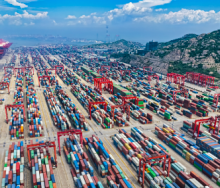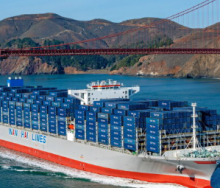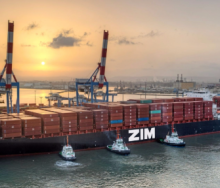Danish shipping giant Maersk has announced a net profit of $6.09 billion for 2024, marking a 56% increase from $3.9 billion in 2023. This impressive growth has been attributed to robust performance across all segments and significantly improved profitability. According to an official release, total revenue rose by nine per cent to $55.5 billion.
The company attributed its strong results to heightened container demand, elevated freight rates in its ocean segment, and steady growth in both terminals and logistics & services.
Vincent Clerc, CEO of Maersk, commented: "Throughout 2024, our ability to navigate shifting circumstances and ensure stable supply chains for our customers was thoroughly tested. Our efforts were rewarded with record-high customer satisfaction. We successfully capitalised on increased demand while enhancing productivity and rigorously managing costs — all of which contributed to our strong financial performance. With three robust business divisions — ocean, logistics & services, and terminals — along with integrated supply chain offerings, we are uniquely positioned to support our customers in an era of geopolitical uncertainty and ongoing disruptions, which continue to highlight the necessity of resilient supply chains."
The rise in profitability was largely driven by higher freight rates, reflecting the impact of the Red Sea situation and strong volume demand. The company maintained high utilisation levels and exercised stringent cost discipline, ensuring streamlined operations despite market uncertainties. While operational costs remained stable year-on-year, Maersk was able to offset increased expenses and higher bunker consumption due to rerouting its network south of the Cape of Good Hope.
Revenue from logistics & services climbed to $14.9 billion, reflecting a seven per cent increase. This growth was primarily supported by solid performance in warehousing, air freight, and first-mile product categories. Profitability also improved across most logistics offerings.
The terminals segment reported revenue of $4.5 billion and an EBIT of $1.3 billion. Growth in this division was driven by higher volumes, inflation-offsetting tariff increases, an optimised customer and product mix, and increased storage revenue.
Looking ahead, Maersk anticipates an EBIT in the range of $300 million for 2025, assuming global container volume growth of approximately four per cent. The company expects market growth to be in line with this projection. However, 2025 is likely to witness a greater supply-demand imbalance due to continued new vessel deliveries and a potential reopening of the Red Sea. While this imbalance poses a challenge, Maersk believes supply-side factors and robust market demand will mitigate its impact.
For financial forecasting purposes, Maersk assumes that the Red Sea will reopen mid-year for the lower end of its EBIT guidance and at year-end for the higher end. The company also acknowledged that its 2025 outlook remains subject to macroeconomic uncertainties affecting container volume growth and freight rates.
STAT Media Group reports that Maersk returned $1.6 billion to shareholders in 2024 through dividends and share buy-backs. The demerger and spin-off of Svitzer contributed an additional $1.1 billion to shareholders via a dividend in kind. Furthermore, the board has approved a share buyback programme of up to DKK 14.4 billion (approximately $2 billion), which will be executed over the next 12 months.
With its diversified business model and strategic resilience, Maersk remains well-positioned to navigate the evolving global supply chain landscape in 2025 and beyond.













